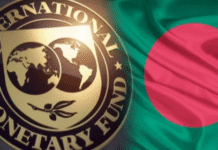Last update on: Fri Jun 21, 2024 01:10 AM

The proposed budget for fiscal year 2024-25 has enough measures to rein in inflation which has been persistently rising, agricultural economists said at a post-budget seminar yesterday.
“Many economists termed the budget as traditional and said that it would not help to contain inflation. But it is not correct. This is a bold and moderate budget,” said Prof Shamsul Alam, an agricultural economist and former state minister for planning.
He made the comments while speaking as chief discussant at an event at Bangladesh Agricultural Research Council in the capital’s Farmgate.
On June 6, Finance Minister Abul Hassan Mahmood Ali announced a Tk 797,000 crore budget.
According to the government’s 8th Five-Year Plan, the budget was supposed to be Tk 2 lakh crore higher this time. But this year’s budget has been kept small to control inflation, he said.
“Usually, the government proposes a big budget to keep people happy. But the government did not do it. That’s why it’s a bold budget,” Prof Alam added.
Similarly, the government has reduced its development budget and cut corporate taxes as well as the source tax on essential products.
The government also plans to impose taxes on cars imported by members of parliament, install electronic fiscal devices (EFDs), and make proof of return submissions compulsory for businesses while taking or renewing licences, he said.
Sajjadul Hasan, chairman of a Parliamentary Standing Committee on the Ministry of Civil Aviation and Tourism, urged Bangladesh Competition Commission to play a proactive role in monitoring the market.
Mohammad Jahangir Alam, a professor at Bangladesh Agricultural University, said the coordinated fiscal measures and contractionary monetary policy would address inflation.
However, the proposed reduction of import duties on various production materials and machinery, including agricultural inputs, may contribute to inflation, he said.
Ahasanul Islam Titu, state minister for commerce, lamented the lack of accurate data on estimations of agricultural production and urged economists to ensure adequate research on the supply chain.
“We often face sudden crises of perishable goods as we don’t know the exact amount of production. Many institutions and researchers give different projections,” he said.
“But when I go to the warehouse, that is not reflected. If we could be informed earlier, we would know how much will be imported,” he said.
The commerce ministry will set up around 10,000 permanent shops to sell essential commodities through the Trading Corporation of Bangladesh, according to Titu.
Speaking as chief guest, Finance Minister Ali said the World Bank is continuing to extend loans to Bangladesh as the global lender thinks the country is on the right track.
The minister was also critical of people who commented that the country would soon go bankrupt.
“How could one say that Bangladesh is going to be bankrupt or has gone bankrupt?” he asked.
He added, “We have proposed a people-friendly budget. Try to understand this. There is still time to revise the budget as it has not yet been passed.”
The minister also urged critics to be careful and responsible when commenting on the economy.









